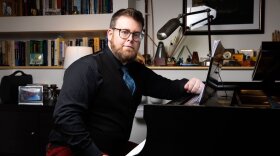Each week, Tyler Kline journeys into new territory and demystifies the music of living composers on Modern Notebook. Listen for a wide variety of exciting music that engages and inspires, along with the stories behind each piece and the latest releases from today’s contemporary classical artists. Discover what’s in store on Modern Notebook, every Sunday night from 8 to 10 on Classical WSMR.
-
On the next Modern Notebook with Tyler Kline: Called a “dream group” by The New York Times after just one concert, the ensemble Owls brings together members of Kronos Quartet and acclaimed soloists. Their debut album Rare Birds is built on joy, curiosity, and experimentation — ending with a 14-minute celebration of minimalism and 5/4 rhythm by Terry Riley.Then: A single chord for viola grew into something unexpected for composer Karin Rehnqvist — a piano improvisation, then an electronic voice that sounded like the sea. In her piece “I thought the sea would sing to me,” she explores the viola’s depths, from the warmth of the C string to shimmering quarter tones and playful musical gestures.
-
On the next Modern Notebook with Tyler Kline: Some events seem to happen by chance — but still leave a lasting impact, from moment to moment, measure to measure. That idea is at the heart of Marc Mellits’ “Discrete Structures,” a set of miniature movements that connect and complete each other in surprising ways, drawn from shared musical material and personal moments of serendipity.Then: The trombone is often cast as the Big Bad Wolf or the Clown. But in Jonathan Dove’s “Stargazer,” it becomes something else entirely — a stargazer, searching the night sky while the orchestra shimmers around it, with subtle threads of Twinkle, Twinkle, Little Star woven throughout.
-
Coming up on this week’s Modern Notebook with Tyler Kline: Collective Wisdom is the name of the final movement of a three-movement string quintet Michael Gilbertson composed nearly 10 years ago. And the composer says that he really struggled writing this piece… and that the music reflects the many complicated emotions he experienced while writing it.And we’ll hear a piece by John Luther Adams that traces long melodies across an imaginary day: from the darkness of midnight, to the brightness of noontime, and back. It’s a work for five double basses called “Darkness and Scattered Light.”
-
On the next Modern Notebook with Tyler Kline: You have likely never heard of a Pronomos flute, and probably for good reason - it’s an instrument that was invented just 14 years ago! But on this week’s Modern Notebook, you’ll have a chance to hear it in this work by Spanish composer Eduardo Costa Roldan: it’s titled Dos Imágenes, and it is a duo composed for this new instrument alongside a standard flute.Then: Have you ever had trouble falling asleep at night, tossing and turning, or simply just reflecting on the day that just ended? Composer Ching-Chu Hu has captured these feelings in music, with a piece called “Night:” two movements for cello and piano that begins with a kind of still lullaby, before stirring into that familiar “Tossing and Turning.”
-
On this week’s Modern Notebook with Tyler Kline: The Orpheus Myth has provided inspiration to composers for centuries, including Missy Mazzoli with her work “Orpheus Undone.” It’s a two-movement orchestral work which explores two brief moments from the myth in order to explore the baffling and surreal stretching of time in moments of trauma or agony.Plus, like many composers who have come before him, Hans Abrahamsen is always considering ways to transform and re-think his own, earlier pieces into new, fresh versions. That’s the case with his Ten Sinfonias, a work born from an earlier string quartet work that is designed like a baroque instrumental prelude.
-
On this week’s Modern Notebook with Tyler Kline: The Okanagan Nation has a story in which The Great Chief calls all animals together to tell them that there is a new kind of people coming to live on Earth, and that each of them must come back at first morning light and choose their new name to be called forever. We’ll hear a piece by Jerod Impichchahaaha Tate which turns this story into music, titled “Spirit Chief Names the Animal People.”Then: In her work Tantrums, composer Asha Srinivasan musically draws a connection between the aftermath of the 2016 national election and her toddler’s tantrums. It is music which explores an array of melodies, modes, rhythms, extreme dynamics, range, and extended techniques to convey her own political frustration and anger.
-
On this week’s Modern Notebook with Tyler Kline: Composer Lei Liang truly admires the music of Mongolia, resulting in Mongolian music serving as the inspiration for several pieces of his… including this piece, titled “Gobi Gloria.” It is music that includes shades of Mongolian long-chant, as well as music of dance and shaman rituals.Then, John Liberatore’s eight-movement work for percussion, prepared piano, and guitar, “Catch Somewhere” takes its inspiration and movement titles from Walt Whitman’s poem titled “A Noiseless Patient Spider.” It’s poetry - and in turn, music - that draws an analogy between the spider’s web weaving and the artist’s creative activity.
-
On the next Modern Notebook with Tyler Kline: An important part of composer Alvin Singleton’s compositional process is researching other pieces composed for the instrumentation he’s working on. For his piece “Time Past, Time Future,” for piano and string orchestra, he only found one such piece - one by composer Alfred Shnittke. And this became his starting point.Then: Synesthesia is a phenomenon where one’s brain receives sensory information through multiple unrelated senses, which causes the person to experience more than one sense simultaneously - like seeing colors while listening to music. We’ll hear a work by Kate Moore called “Synesthesia Suite,” inspired in part by this phenomenon.
-
On this week’s Modern Notebook with Tyler Kline, we’ll hear music for multi-tracked cello by Fjóla Evans titled “Augun, as well as performances by vibraphonist Yang Chen and pianist Awadagin Pratt. And a work by Mette Nielsen titled “Together,” which is one of three, modular companion pieces that can be performed by a soloist alone, an ensemble apart, or - in this case - all together.Plus: An instrumental concerto is often known to give the soloist an opportunity to really play some virtuosic music… but what happens when the concerto is for the entire orchestra? Composer Jennifer Higdon says, at least in her Concerto for Orchestra, that everybody gets to show off a little bit - the principal players, the individual sections, and the entire orchestra at once.
-
A reminder of our shared humanity in the form of music is coming up on this week’s Modern Notebook with Tyler Kline, with a work by Valerie Coleman called “Tracing Visions. It’s a two movement work that begins with what she calls a “fierce parental statement” to protect children, and ends with a celebration of global unity.Then, we’ll hear this virtuosic work for solo piano by Phong Tran titled “Rotation.” It’s music that is made up of shifting rhythmic patterns, resulting in unrelenting sonic textures.
-
On the next Modern Notebook with Tyler Kline: “Assemble” is the name of this piece by Emily Cooley for multi-tracked cellos… but it also describes the piece quite literally, because, as the composer says, “the title describes what I felt like I was doing while composing: assembling a sort of puzzle.”Then a work by Paola Prestini inspired, in part, by frozen moments in time, and the feeling of being in love. It’s titled “Code,” a work for piano and orchestra inspired by the relationship between TS and Emily Hale, music that Prestini dedicates to an invented love with an 8 letter code name.
-
On this week’s Modern Notebook with Tyler Kline, we’ll hear a work by Jessie Montgomery for solo cello and orchestra called “Divided”… music that is a response to the social and political unrest that has plagued our society in the recent past.Then, a work that reaches back nearly 500 years for inspiration. It’s Nico Muhly’s “Reliable Sources,” a concerto for bassoon that draws on the history of the instrument, and its use in sacred music of the 16th Century.
-
Okjökull is the name of a former glacier in Iceland - former, because recently due to a warming climate, it completely melted. On the next Modern Notebook with Tyler Kline, we’ll hear a work by Roger Zare that is a requiem for this glacier, plus solo double bass music by Dai Fujikura, and string music by Akenya Seymour.Then: What does music of healing sound like? Music that examines the capacity of our nervous systems… music that seeks to identify and embrace our most difficult feelings? We’ll hear this massive work by Shara Nova for acapella choir called “Titration,” a nearly hour-long cycle of healing songs that not just examines our lived - and sometimes traumatic - experiences but seeks to offer us a respite.
-
One of the best things about the music of living composers is that they are able to respond to and make art out of the world around us. On the next Modern Notebook with Tyler Kline, tune in for a program of works that respond to one of our greatest modern challenges: the Climate Crisis.We’ll hear Lisa Robertson’s “To Tell It Like It Is,” which sets data about climate change to music for voices; and this piece by David Ludwig called “Seasons Lost,” and how the distinctions between seasons are beginning to disappear throughout the world. Plus, Deena T. Grossman’s “Wildfires,” Reena Esmail’s “inconvenient wounds,” and more.


















